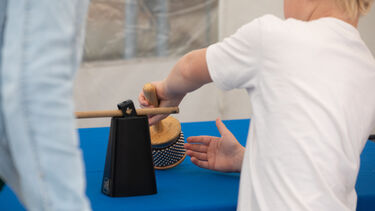The study, published in Frontiers in Psychology, offers novel insights into how these social and motor skills are interconnected, highlighting the social underpinnings of musical synchronisation.
The ability to synchronise with others is a fundamental skill for group music-making, and while musical training enhances this capacity, a basic ability to synchronise exists in most individuals regardless of their musical background. Previous research in the psychology of music has pointed to processes like motor simulation and interpersonal empathy as key contributors to this skill.
This latest investigation by Dr Persefoni Tzanaki, Professor Renee Timmers and Professor Tuomas Eerola delved into these connections in detail, examining pairs of school-aged children. Across two experiments, the study explored the role of ‘trait empathy’ (a person's general level of empathy) and ‘induced empathy’ (empathy specifically triggered during the experiment) on their ability to synchronise during a joint tapping task. Crucially, the researchers also investigated how manipulated synchrony influenced the children's experience of empathy.
Key findings:
- Trait empathy is linked to stronger synchronisation: the research confirmed that children with higher levels of trait empathy demonstrated a stronger ability to synchronise their movements.
- Synchronised behaviours foster experienced empathy: the study also found that when children successfully synchronised, it supported their feelings of empathy towards their partner.
- Social basis of synchronisation: the findings underscore the inherent social nature of synchronisation behaviour, including within musical contexts.
According to Dr Persefoni Tzanaki, "This is the first study to explore the relationship between empathy and synchrony in music from a bidirectional perspective – that is, examining both the role of empathy in how children coordinate their movements in joint musical tasks, and how the synchrony they achieve fosters social bonding and mutual empathy."
She added, "The findings highlight the social nature of children’s collective musical engagement, paving the way for further research into such reciprocal dynamics in musical interactions."
This study breaks new ground by being the first to investigate the role of empathy in facilitating interpersonal synchrony in young populations. An intriguing additional finding was the influence of pairs’ gender composition, suggesting the impact of gender-related social dynamics on synchronisation.

